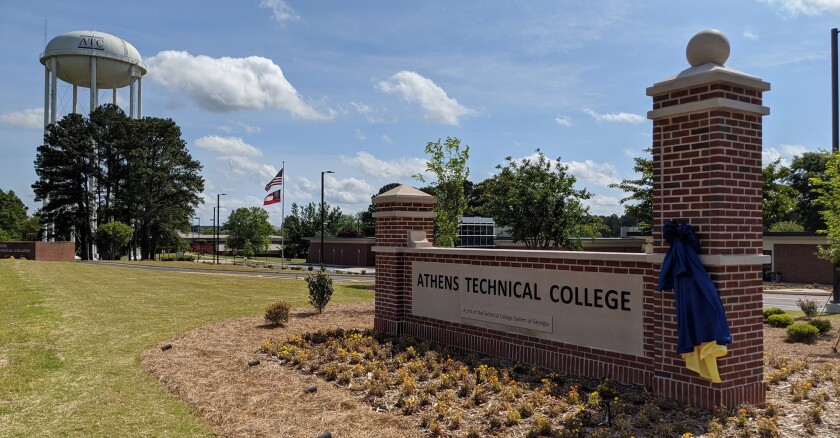Science
Georgia’s Technical College System Embraces AI to Enhance Workforce

Greg Dozier, the commissioner of the Technical College System of Georgia (TCSG), addressed the Marietta Rotary Club this week, outlining his vision for transforming lives through skill development. The TCSG oversees Georgia’s 22 technical colleges, with a mission to provide individuals with the necessary skills to achieve economic success. Dozier emphasized the importance of creating opportunities for personal and professional growth during his presentation.
Since his appointment by Governor Brian Kemp in January 2020, Dozier has led a workforce of over 12,000 employees and manages an annual budget exceeding $1.1 billion. He remarked, “I don’t know if we’re in our golden era, but we’re in a really neat time for TCSG and how it’s being seen, but also how it’s setting the stage for this state and for the folks in this state.”
Enrollment Growth and Workforce Development
According to Dozier, the TCSG served 538,164 people in 2024, experiencing the highest enrollment figures since 2013, with 148,000 students enrolled in technical colleges across the state. “Our mission is to truly make sure we have a globally competitive workforce for the state of Georgia,” he stated.
The TCSG focuses on five key pillars: technical education, adult education, economic development, workforce services, and the Quick Start program. Each pillar is designed to equip individuals with the skills necessary to enter the workforce successfully. The Quick Start program provides free training and educational services to businesses, ensuring that new companies can qualify for support through the Department of Economic Development.
“Any new company coming to the state of Georgia gets a chance to qualify through the Department of Economic Development for Quick Start services,” Dozier explained.
Integrating AI into Technical Education
During the discussion, club member Sandeep Kapoor inquired about the role of artificial intelligence (AI) in technical education. Dozier addressed this by discussing ongoing efforts to incorporate AI into learning programs. “We’re looking at it on instruction, how can AI enhance instruction, tutoring, how do we administer student use of AI,” he said, adding that curriculum development is underway to include AI in fields such as healthcare, manufacturing, and cybersecurity.
Kapoor expressed his satisfaction with Dozier’s response, stating, “I was very surprised in a positive way that they are considering AI as it impacts the careers and how the graduates are going to come out of the careers being able to work in a field where AI can be incorporated.”
Another audience member raised the issue of potential free tuition for technical schools. Dozier responded that for high-demand career paths—including construction, education, nursing, and cybersecurity—tuition can be covered by the HOPE Career Grant. This grant aims to increase the workforce in industries facing labor shortages. “It is not GPA oriented. It is purely a skill-oriented grant opportunity,” he clarified.
In closing, Dozier highlighted his pride in being part of an agency dedicated to making a positive impact on communities: “I couldn’t be more proud to be part of an agency and a group of folks whose everyday mission is to change the communities and the lives in our community.”
-

 Health2 months ago
Health2 months agoNeurologist Warns Excessive Use of Supplements Can Harm Brain
-

 Health3 months ago
Health3 months agoFiona Phillips’ Husband Shares Heartfelt Update on Her Alzheimer’s Journey
-

 Science4 weeks ago
Science4 weeks agoBrian Cox Addresses Claims of Alien Probe in 3I/ATLAS Discovery
-

 Science4 weeks ago
Science4 weeks agoNASA Investigates Unusual Comet 3I/ATLAS; New Findings Emerge
-

 Science3 weeks ago
Science3 weeks agoScientists Examine 3I/ATLAS: Alien Artifact or Cosmic Oddity?
-

 Science3 weeks ago
Science3 weeks agoNASA Investigates Speedy Object 3I/ATLAS, Sparking Speculation
-

 Entertainment4 months ago
Entertainment4 months agoKerry Katona Discusses Future Baby Plans and Brian McFadden’s Wedding
-

 World2 months ago
World2 months agoCole Palmer’s Cryptic Message to Kobbie Mainoo Following Loan Talks
-

 Entertainment4 months ago
Entertainment4 months agoEmmerdale Faces Tension as Dylan and April’s Lives Hang in the Balance
-

 Science3 weeks ago
Science3 weeks agoNASA Scientists Explore Origins of 3I/ATLAS, a Fast-Moving Visitor
-

 Entertainment4 months ago
Entertainment4 months agoLove Island Star Toni Laite’s Mother Expresses Disappointment Over Coupling Decision
-

 Entertainment3 months ago
Entertainment3 months agoMajor Cast Changes at Coronation Street: Exits and Returns in 2025









